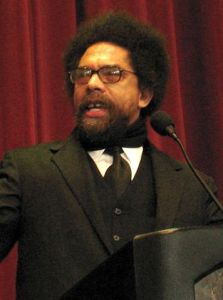
In a recent public drubbing of Cornel West, Michael Eric Dyson laid into the Princeton public intellectual for a variety of reasons in what was both a stringent personal attack and a mournful elegy to a declining mentor. One of Dyson’s most incisive critiques was that West’s claim to the prophet’s mantle rings hollow, lacking the nuance both of biblical exegesis and ecclesial experience. Dyson, a Georgetown professor, raises some serious questions here not just of West but of all Christians who would blithely claim the prophetic role for themselves. Consider the following excerpts (subheadings are my own):
Defining the Prophet
“To paraphrase Supreme Court Justice Potter Stewart’s famous definition of pornography, West may not seek to define a prophet, but he knows one when he sees one, and quite often, they sound just like him. This limp understanding of prophecy plays to his advantage because he can bless or dismiss prophets without answering how we determine who prophets are, who gets to say so, how they are different from social critics, to whom they answer, if they have standing in religious communities, or if God calls them.”
Prophecy Demands Institutional Accountability
“But ordained ministers, and especially pastors, must give account to the congregations or denominations that offer them institutional support and the legitimacy to prophesize. They may face severe consequences—including excommunication, censorship, being defrocked, or even expelled from their parishes—for their acts. The words and prophetic actions of these brave souls impact their ministerial standing and their vocation. West faces no such penalty for his pretense to Christian prophecy.”
“West might argue that not being ordained leaves him free to act on his prophetic instincts and even disagree with the church on social matters. Thus he avoids the negative consequences of ordination while remaining spiritually anchored. That’s fine if you’re a run-of-the-mill Christian, but there is, and should be, a higher standard for prophets. True prophets embrace religious authority and bravely stand up to it in the name of a higher power. The effort to escape responsibility should sound an alarm for those who hold West’s views about how prophets should behave.”
“As a freelancing, itinerant, nonordained, self-anointed prophet, West has only to answer to himself. That may symbolize a grand resistance to institutional authority, but it’s also a failure to acknowledge the institutional responsibilities that religious prophets bear. Most ministers are clerics attending to the needs of the local parish. Only a select few are cut from prophetic cloth. Yet nearly all the religious figures we recognize as prophets—Adam Clayton Powell Jr., King, Jackson, Sharpton—were ordained as ministers. Powell and King were pastors of local churches as well. To be sure, there are prophets who are not ministers or religious figures—especially women whose path to the ministry has been blocked by sexist theologies—but most of them have ties to organizations or institutions that hold them accountable.”
“Prophets, as a rule, don’t have tenure. West gets the benefits of the association with prophecy while bearing none of its burdens. By refusing to take up the cross he urges prophetic Christians to carry, West is preaching courage while seeking to avoid reprisal or suffering. Playing it safe means that West doesn’t qualify for the prophetic role he espouses.”
Is Anything Critical or Counter-Cultural Prophetic?
“What makes West a prophet? Is it his willingness to call out corporate elites and assail the purveyors of injustice and inequality? The actor Russell Brand does that in his book Revolution. Is he a prophet? Is it West’s self-identification with the poor? Tupac Shakur had that on lock. Should we deem him a prophet? Is it West’s self-styled resistance to police brutality, evidenced by his occasional willingness to get arrested in highly staged and camera-ready gestures of civil disobedience, such as in Ferguson last fall?”
Conclusion
Dyson raises crucial questions for any Christians who would blithely ascend to the prophetic office. Most especially, he reminds us that true prophets are always close enough to the Christian community (by ordination and other relationships) to be held responsible, to be able to receive praise or blame for their actions. The lone prophet has, by contrast, won his or her mantle cheaply, like a bitter child who buys a championship trophy at a pawn shop and then fancies himself All-State.
Let those with ears, hear.
P.S. Given what Dyson has said about prophets not having tenure, I wonder if it possible for United Methodist elders to be prophets in any real sense of the term?

One thought on “West, Dyson, & the Independent Prophet as False Prophet”